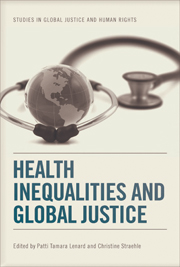Book contents
- Frontmatter
- Contents
- Acknowledgements
- Notes on the Contributors
- Introduction: Health Inequality and Global Redistributive Justice
- Part 1 A Right to Equal Health?
- Part 2 Who is Responsible for Remedying Global Health Inequality?
- 5 Re-examining the Ethical Foundations: Behind the Distribution of Global Health
- 6 Global Health and Responsibility
- 7 Outlining the Global Duties of Justice owed to Women living with HIV/AIDS in Sub-Saharan Africa
- Part 3 Measuring Health and Health Outcomes
- Part 4 Borders and Health
- Bibliography
- Index
6 - Global Health and Responsibility
from Part 2 - Who is Responsible for Remedying Global Health Inequality?
Published online by Cambridge University Press: 05 August 2013
- Frontmatter
- Contents
- Acknowledgements
- Notes on the Contributors
- Introduction: Health Inequality and Global Redistributive Justice
- Part 1 A Right to Equal Health?
- Part 2 Who is Responsible for Remedying Global Health Inequality?
- 5 Re-examining the Ethical Foundations: Behind the Distribution of Global Health
- 6 Global Health and Responsibility
- 7 Outlining the Global Duties of Justice owed to Women living with HIV/AIDS in Sub-Saharan Africa
- Part 3 Measuring Health and Health Outcomes
- Part 4 Borders and Health
- Bibliography
- Index
Summary
INTRODUCTION
A striking feature concerning the state of global health is that it is characterised by some radical disparities, including those in life expectancy, maternal mortality and malaria-related deaths. Do we have any responsibilities with respect to improving global health? I begin my answer to this question by surveying a number of international practices that contribute to poor global health. We can then appreciate the wide range of different kinds of international practices and policies that facilitate poor global health. Which, if any, are we obligated to reform in our decidedly non-ideal world? How should we allocate responsibilities fairly in bringing about some necessary reforms? I argue that there is an important class of remedial responsibilities that falls on many citizens of affluent, developed states, and their primary agents of change, governments. In order to appreciate why this conclusion follows, I analyse the notion of remedial responsibilities and the grounds on which it may fairly be allocated.
GLOBAL HEALTH: SOME PROBLEMS AND PATTERNS
One of the most striking features about the state of global health is that it is characterised by radical inequalities. Here is just a sample of the more widely noticed kinds. Life expectancy at birth varies enormously: life expectancy in Sierra Leone or Afghanistan is about forty years, whereas those lucky enough to be born in Japan or Australia enjoy a life expectancy of twice that at approximately eighty (Benatar and Upshur 2011: 14–15).
- Type
- Chapter
- Information
- Health Inequalities and Global Justice , pp. 102 - 118Publisher: Edinburgh University PressPrint publication year: 2012



